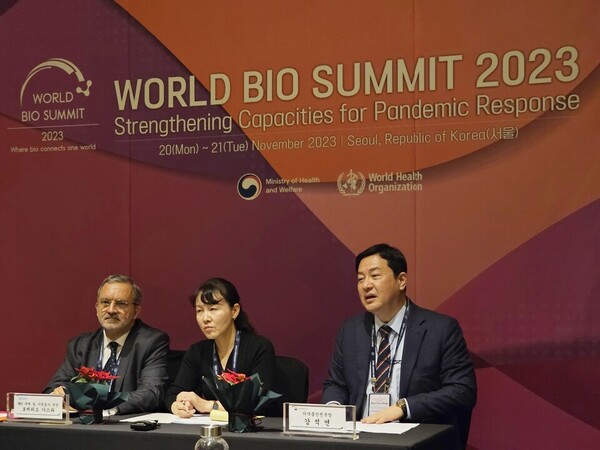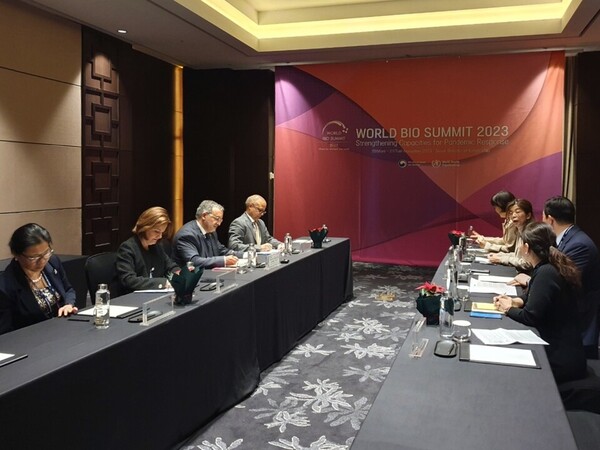The Ministry of Food and Drug Safety (MFDS) has placed itself in the WHO Listed Authorities (WLA), demonstrating its regulatory capabilities in medicines and vaccines. The WHO's recognition of the ministry’s regulatory capabilities is expected to accelerate the export of Korean medicines to Southeast Asian and Latin American markets.

Kang Seok-yeon, director-general of the Pharmaceutical Safety Bureau at the MFDS, and Rogerio Gaspar, director of WHO’s Regulation and Prequalification Department, held a meeting in Seoul on Tuesday as part of the 2023 World Bio Summit.
During the working-group meeting, the two discussed utilizing the WLA and plans and explained them at a news conference.
Gaspar, who is in charge of WLA listing and oversees regulatory and prequalification affairs at WHO, explained the significance of the introduction of WLA, the program's future direction, and the results of the MFDS’s evaluation. According to him, the World Health Organization is replacing the list of Stringent Regulatory Authorities (SRAs) with the WLA.
Earlier, the MFDS attained Maturity Level 4 (ML4), the highest level in WHO's classification of medicines regulatory authorities, making it eligible to apply for inclusion in the WLA, which can be applied for from Level 3 and above.
Korea's MFDS joined Singapore and Switzerland to go on the list for the first time since the WHO introduced the WLA. Except for Switzerland, an existing SRA, Korea, and Singapore are the only countries to have achieved WLA status based on regulatory capacity assessment alone. That also explains why Gaspar emphasized that the two countries will be the "global standard" for future regulatory environment assessments.
"I congratulate MFDS on its WLA listing," Gaspar said. "Korea's (drug and vaccine) regulatory environment has reached a global level. This is of great significance in terms of public health. The WHO aims to ensure that the world has access to safe and effective medicines, and we expect MFDS to play a major role in ensuring this."
Director Gaspar noted that Korea has a very good vaccine regulatory environment and plans to review the MFDS’s vaccine regulations and apply them to other countries.
"WHO will conduct assessments of regulators in WHO member countries, including those on the SRA, and will start with 35 countries in the first quarter of next year and complete all assessments by 2025," Gaspar said. "WLA listing will play an important role in helping other international organizations, including UNICEF, procure safe medicines and provide fast-track access to WHO PQ (prequalification) certification."

The WHO, an evaluator of sorts for national regulators, has also identified areas for improvement. While the MFDS won recognition in all nine of the WLA's functions in the vaccine category, it was recognized in eight drug categories, failing to win recognition in one category.
"There were some inconsistencies in the drug review," Gaspar said. “The validity period of the WLA listing is five years, and we believe that the MFDS can quickly compensate for the deficiencies and renew the listing within the period."
Director-General Kang presented his ministry’s position on this.
“There were some disagreements about the post-marketing surveillance of medicines. We explained the specificity of Korea, where MFDS and the Ministry of Health and Welfare divide the tasks, and signed a business agreement that the two organizations will work together smoothly, which was accepted by the WHO,” Kang said. “Another thing is the way we record the review contents during the review process, which will become in line with the WHO method."
Kang also emphasized the economic benefits of the WLA listing, saying it makes it easier to be recognized as a reference agency for drug approval by other national regulatory agencies and to enter into mutual recognition agreements (MRAs).
"Vietnam, which utilizes the SRA as a reference country, recently achieved ML level 3 to be listed on the WLA," Kang said. "Recently, (MFDS) has signed MOUs with Paraguay and Nigeria, and we expect discussions on the selection of reference countries to proceed," he said.
Kang noted that the MFDS will also sign an MRA with Singapore, another WLA member. MRAs provide full exemption from GMP on-site inspections for each other. He added that the ministry needs to sign a bilateral MOU, which is expected to be finalized by the end of this year or early next year. Then, domestic drugs exported to Singapore will not be subject to GMP inspections by the Singaporean authorities, stressing that it would be the best practice for WLA.
"What the WHO is trying to achieve through the WLA is not to grade national regulatory agencies, but to improve the capacity of regulatory agencies around the world and to build collaborative relationships through mutual trust so that high-quality medicines can be supplied," Kang said. "As a WLA-listed country, MFDS will do its best to contribute to public health responsibly.”
Related articles
- World Bio Summit 2023 concludes with a global call to action for health security
- World Bio Summit 2023 takes a deep dive into preparing for the next pandemic
- Korea honors partners for 'Global Training Hub for Biomanufacturing' at WBS 2023
- World Bio Summit 2023: A united platform for preparing the future against infectious diseases

